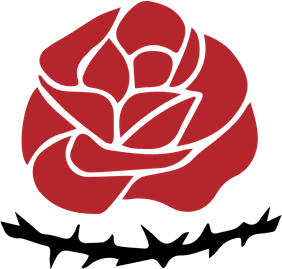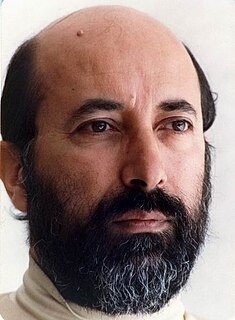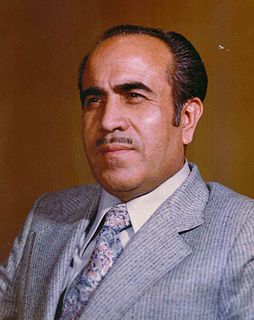Right-wing politics hold that certain social orders and hierarchies are inevitable, natural, normal, or desirable, typically supporting this position on the basis of natural law, economics, or tradition. Hierarchy and inequality may be viewed as natural results of traditional social differences or the competition in market economies. The term right-wing can generally refer to "the conservative or reactionary section of a political party or system".

The Tudeh Party of Iran is an Iranian communist party. Formed in 1941, with Soleiman Mohsen Eskandari as its head, it had considerable influence in its early years and played an important role during Mohammad Mosaddegh's campaign to nationalize the Anglo-Persian Oil Company and his term as prime minister. The crackdown that followed the 1953 coup against Mosaddegh is said to have "destroyed" the party, although it continued. The party still exists, but has remained much weaker as a result of its banning in Iran and mass arrests by the Islamic Republic in 1982, as well as the executions of political prisoners in 1988.

Ebrahim Yazdi was an Iranian politician, pharmacist, and diplomat who served as deputy prime minister and minister of foreign affairs in the interim government of Mehdi Bazargan, until his resignation in November 1979, in protest at the Iran hostage crisis. From 1995 until 2017, he headed the Freedom Movement of Iran. Yazdi was also a trained cancer researcher.

Mehdi Bazargan was an Iranian scholar, academic, long-time pro-democracy activist and head of Iran's interim government, making him Iran's first prime minister after the Iranian Revolution of 1979. He resigned his position as prime minister in November 1979, in protest at the US Embassy takeover and as an acknowledgement of his government's failure in preventing it.

Liberalism in Iran or Iranian liberalism is a political ideology that traces its beginnings to the 20th century.

The First Iranian presidential election was held on January 25, 1980, one year after the Iranian Revolution when the Council of Islamic Revolution was in power.

The Islamic Republican Party formed in mid-1979 to assist the Iranian Revolution and Ayatollah Khomeini establish theocracy in Iran. It was disbanded in May 1987 due to internal conflicts.

Mostafa Chamran Save'ei was an Iranian physicist, politician, commander and guerrilla who served as the first defense minister of post-revolutionary Iran and as member of parliament, as well as the commander of paramilitary volunteers in Iran–Iraq War, known as "Irregular Warfare Headquarters". He was killed during the Iran–Iraq War. In Iran, he is known as a martyr and a symbol of an ideological and revolutionary Muslim who left academic careers and prestigious positions as a scientist and professor in the US, University of California, Berkeley and migrated in order to help the Islamic movements in Palestine, Lebanon, Egypt as a chief revolutionary guerilla, as well as in the Islamic revolution of Iran. He helped to found the Amal Movement in southern Lebanon.

The Freedom Movement of Iran (FMI) or Liberation Movement of Iran is an Iranian pro-democracy political organization founded in 1961, by members describing themselves as "Muslims, Iranians, Constitutionalists and Mossadeghists". It is the oldest party still active in Iran and has been described as a "semi-opposition" or "loyal opposition" party. It has also been described as a "religious nationalist party".
The Muslim People's Republic Party (MPRP) or Islamic People's Republican Party was a short-lived party associated with Shia Islamic cleric Shariatmadari. It was founded in 1979 during the Iranian Revolution as a "moderate, more liberal counterweight" to the theocratic, Islamist Islamic Republican Party (IRP) of Ayatollah Ruhollah Khomeini, and disbanded in 1980.
The consolidation of the Iranian Revolution refers to a turbulent process of Islamic Republic stabilization, following the completion of the revolution. After the Shah of Iran and his regime were overthrown by revolutionaries in February 1979, Iran was in a "revolutionary crisis mode" from this time until 1982 or 1983. Its economy and the apparatus of government collapsed. Military and security forces were in disarray.

Parliamentary elections were held in Iran on 13 March 1980, with a second round on 9 May. They were the first elections to the Majlis since the overthrow of the Shah, and were contested to a considerable degree on a party basis.

The Interim Government of Iran, officially the Provisional Revolutionary and Islamic Government of Iran was the first government established in Iran after the Iranian Revolution, and the first nominal republic established in Iran after 2,500 years of Persian monarchy. The regime was headed by Mehdi Bazargan, one of the members of the Freedom Movement of Iran, and formed on the order of Ruhollah Khomeini on 4 February 1979. From 4 February to 11 February, Bazargan and Shapour Bakhtiar, the Shah's last Prime Minister, both claimed to be the legitimate prime minister; Bakhtiar fled on 11 February. Mehdi Bazargan was the prime minister of the interim government and introduced a seven-member cabinet on 14 February 1979. Ebrahim Yazdi was elected as the Foreign Minister.

Constitutional Convention elections were held in Iran on 3 and 4 August 1979. The result was a victory for the Islamic Republican Party. 10,784,932 voted in the elections, marking 51.71% turnout. Of all members elected, 68% were clerics.
A revolutionary movement is a specific type of social movement dedicated to carrying out a revolution. Charles Tilly defines it as "a social movement advancing exclusive competing claims to control of the state, or some segment of it". Jeff Goodwin and James M. Jasper define it more simply as "a social movement that seeks, as minimum, to overthrow the government or state".
Office for the Cooperation of the People with the President was a political entity in Iran close to then-President Abolhassan Banisadr. It was an “office” "that was created out of necessity to fulfil some, if not all, of the functions of a political party".
League of Socialists of the National Movement of Iran or Society of Iranian Socialists was a socialist nationalist party in Iran.

Socialism in Iran or Iranian socialism is a political ideology that traces its beginnings to the 20th century and encompasses various political parties in the country. Iran experienced a short Third World Socialism period at the zenith of the Tudeh Party after the abdication of Reza Shah and his replacement by his son, Mohammad Reza Pahlavi. After failing to reach power, this form of third world socialism was replaced by Mosaddegh's populist, non-aligned Iranian nationalism of the National Front party as the main anti-monarchy force in Iran, reaching power (1949–1953), and it remained with that strength even in opposition until the rise of Islamism and the Iranian Revolution. The Tudehs have moved towards basic socialist communism since then.

Mostafa Katiraei was an Iranian engineer and politician who served in the interim government of Bazargan as the minister of housing. He was also a member in the Council of the Islamic Revolution.













